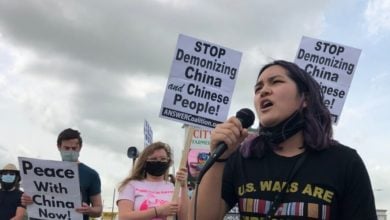On July 24, the president of the Philippines, Rodrigo Duterte, delivered his fourth annual State of the Nation Address to the nation’s Congress, speaking live to the nation from the Session Hall of the House of Representatives, Quezon City. In his 90-minute speech, he hailed economic progress made in the last three years of his presidency, promised to bring two million Filipinos out of poverty in the next three years, make greater use of the death penalty, and fight corruption.
Meanwhile, Filipino-led groups around the world — in many cities across the United States, Italy, Australia, the UK, and other countries — organized more than 20 grassroots “People’s State of the Nation” addresses to counter the lies and distortions broadcast by Duterte, and to assess the real state of the land from the eyes and voices of those oppressed and dispossessed by his administration. These include the urban working class, women, LGBTQ people, peasants, children, trade unionists, indigenous and religious minority communities, human rights defenders, peace negotiators, and many other groups who have faced violence since his election in 2016.
In Los Angeles, over 300 people assembled outside of the Philippines Consulate to convene the People’s State of the Nation Address 2019. Organized by the BAYAN Coalition, there were contributions from Anakbayan Los Angeles, Long Beach, San Diego, and UCLA; the Philippines-U.S. Solidarity Organization; GABRIELA Los Angeles; MALAYA: U.S. Movement Against Killings and Dictatorship and for Democracy in the Philippines; the National Ecumenical Forum for Filipino Concerns, Southern California; Migrante Los Angeles and Southern California; the Filipino Workers Center; and Kabataan Alliance. Joining in solidarity were representatives of the Party for Socialism and Liberation, Los Angeles and San Diego; Union del Barrio, Los Angeles; and others.
“The real state of the nation is the voice of the people,” said Mariah, an activist with Migrante, a group fighting for migrant workers from the Philippines in the U.S. “Everything [Duterte] said last night was a lie.”
Six points of unity
The People’s State of the Nation delivered six points of unity to fire back at the images of a placid, just Philippines struggling against decay and corruption painted in the president’s annual address:
- To stop the extrajudicial killings of poor Filipinos, which have risen to above 30,000 dead since 2016, according to the National Commission on Human Rights. Over 140,000 sit in overcrowded prisons on fake drug charges.
- To lift martial law in the island of Mindanao, where increased resource extraction and capitalist development has led to massive-scale human rights violations, displacement of Muslim and indigenous Lumad communities, and destruction of entire settlements like Marawi City.
- To say no to another fascist dictatorship in the Philippines, with Duterte using the considerable amount of power granted him by the U.S. occupation-composed Constitution of the Philippines to lengthen term limits and centralize power in the executive, and pack the cabinet and bureaucracy with his allies.
- To end political dynasties and corruption: accelerating under Duterte’s time in power, the Philippines Congress and Senate are full of long-established families whose hold onto political power has helped them maintain economic privileges over many decades.
- To stand for democracy, and pursue economic, political, and social reforms to benefit the majority of Filipinos, and promote genuine economic development for the many, not the rich or foreign capitalists.
- To defend Filipino sovereignty against foreign domination, with the Duterte government’s ramped-up selling-out of Filipino resources, markets and labor.
After words and prayers from two members of the clergy, speakers from the MALAYA Movement gathered around a vigil table set up with pictures of those killed in Duterte’s three-year “drug war.” The so-called war has really been a cover for massive repression of the urban and rural poor and those standing up to the injustices of the current regime. To music, speakers recounted the stories of individual urban workers, peasant farmer organizers, LGBTQ youth, indigenous Lumad people, human rights activists, and negotiators in peace deals. All of them were killed by representatives of the Philippines government, often by plain-clothes army or police officers, and left dead in the streets or their homes.
Randy Malayao, a negotiator in the peace deals between the Philippines government and the revolutionary New People’s Army, was shot dead by an unidentified gunman while he slept at the back of a packed bus in a town in Nuevo Vizcaya at 2 a.m. He was left to die on the scene. This was 11 years after he was abducted in secret by the Philippines government, tortured, and detained for four years. His is one of literally hundreds of cases of those murdered by the Duterte regime to quiet dissent and terrorize people from fighting back against poverty and underdevelopment. After each story, protesters said “we keep their fire burning,” holding up paper torches with the names of the slain written on them.
A speaker from MALAYA, which was set up in 2018 to initiate a broad international movement for justice in the Philippines, spoke about the impact of their organizing work in the past year. MALAYA started holding community forums across the country, and hosting speaking tours bringing trade unionists, Lumad organizers, women’s leaders, and human rights activists from the Philippines all around the U.S. In April, they held a national summit in Washington, D.C., lobbying Congress representatives and holding a die-in at a government building.
After months of efforts, Brad Sherman — Congress representative for the San Fernando Valley in Los Angeles — called for a congressional hearing on human rights abuses in the Philippines and other parts of Southeast Asia, to be held July 25. In June 2019, as a result of tireless lobbying, a United Nations Human Rights Council adopted a resolution to investigate violations. Extrajudicial killings in the Philippines, while not ending, have decreased significantly in 2019 with increased international attention. The speaker noted how “this demonstrates the importance of a broad movement in the U.S. among Filipinos and non-Filipinos.”
Martial law in Mindanao
Members of GABRIELA, the U.S.-based affiliate of the Filipino women’s movement, used signs, chants, and more individual stories to speak of the impacts of Duterte’s martial law in Mindanao, an island in the Southern Philippines. They related statistics about the 400,000 people displaced in destruction of areas like Marawi City, the over 93 extrajudicial killings, 22,000 attacks on students in Mindanao, and the shutting-down of dozens of Lumad indigenous schools.
By criminalizing entire peoples as terrorists, members of the New People’s Army, the government of the Philippines has been able to terrorize communities into leaving areas earmarked for natural resource mining or the development of tourism. With entire mining operations owned by single dynastic families in the Philippines, as well as by foreign corporations (mostly from the U.S., Japan, Australia, Singapore, Taiwan, and the U.K.) extracting the wealth of the nation, the livelihoods of millions have been destroyed, with denials of human rights to clear a smooth path to those forces exploiting the land and the people.
John Prysner, a member of the Party for Socialism and Liberation, talked about his exposure trip to Mindanao earlier in the month with members of the different organizations organizing the address. He observed seeing the riches of the Philippines (so often described as a “poor country” in mainstream media language) siphoned off for the benefit of the rich in the Philippines and abroad, when “the Philippines government could easily provide for the needs of all.” He added that “if we rise up in unity as one fist, we can end the Duterte regime and get the U.S. out of the Philippines.”
Filipino activists and allies from the San Fernando Valley and the University of California, Los Angeles, spoke about the use of repression by Duterte against prominent public figures, including Leila de Lima, a senator who criticized the drug war and was jailed; Jerome Aba, a Moro (Muslim) activist tortured and deported from the U.S. before he could take part in a speaking tour; Maria Ressa, the CEO of Philippines investigative media platform Rappler, currently on trial for libel charges; and Cristina Palabay, secretary-general of KARAPATAN, a human-rights alliance in the Philippines, who received text messages telling her she was on a government “death list” in April.
Continuing this theme, Steven from the Philippines-U.S. Solidarity Organization spoke about the dominance of puppet governments in the Philippines, who have consistently capitulated to “foreign aggression and imperialist nations,” making concessions to foreign governments and to international drug cartels instead of bringing development for the mass of the people. In 2017, President Donald Trump called the Philippines “a prime piece of real estate from a military standpoint,” with military and police aid to the Philippines topping $193.5 million in 2018 and continuing at similar levels in 2019. Over 280 bilateral defense exercises have been held between the U.S. and the Philippines this year.
Government of national betrayal
Steven concluded: “There is no national sovereignty when the U.S. has military bases in your country and endorses the social cleansing of the poor. The Duterte regime is a government of national betrayal.”
The speaking segments, each touching on a different point of unity, were interspersed with musical and spoken-word performances. After words on solidarity from a member of Unión del Barrio and speeches from Filipino migrant workers organized with Migrante Southern California, who spoke of conditions in the Philippines leading many thousands to migrate every year for survival, Ariana from the BAYAN Coalition closed the People’s Address.
She spoke about the hypocrisy of Duterte’s speech, boasting of economic advances, when his “Build, Build, Build” infrastructure program has displaced people and failed to bring jobs and development, and when millions of farmers have suffered from falling prices for basic commodities like rice. He spoke about fighting corruption, when he has given a record number of handouts to bureaucrats and allowed the unchecked abuse of government offices now stuffed with military and police representatives. He promised to reduce poverty drastically, when inflated petrol prices, increasing contractualization, brutalization of people trying to organize trade or peasants’ unions, and low wages have brought precarity and misery to millions. His lies about price stability, security of land tenure for peasant farmers, his rising approval rating, and identification of dissenters with terrorism and foreign espionage, all disintegrate against the backdrop of suffering wreaked on the Filipino people in the last three years.
“Oust the traitor, torturer, and dictator,” Ariana said. “This is not the president of the people. We are making the call around the country and the world for sovereignty and democracy. We are not here to terrorize, but simply because we are called to serve the people.”
Justice for the Philippines now! End U.S. aid to Philippines! Stop the killings!






